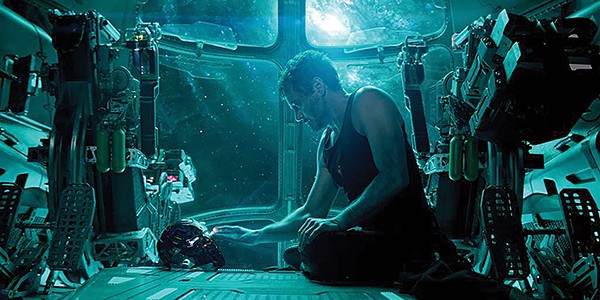J.K. Rowling was a godsend for the publishing industry. Her seven Harry Potter books, published from 1997 to 2007, shifted more than 500 million units worldwide for Scholastic, and taught a generation to love reading.
But in recent years, a question has arisen: Did Harry Potter really teach a generation to love reading, or did it just teach them to love Harry Potter?
When Warner Bros. came calling to J.K. Rowling in 2001, it would prove to be a fateful moment in film history. Film franchises were nothing new, but movie audiences were not expected to keep track of plots longer than a trilogy. Rowling’s dense plotting and expansive dramatis personae made Star Wars look like a family squabble. Like publishers before them, producers tried to reverse engineer the Potter magic. The only person to crack the problem was Kevin Feige, an associate producer on 2000’s X-Men who was hired to wring maximum value from Marvel Comics.

Robert Downey Jr. (above) faces his fate as Avengers: Endgame closes out the Marvel Decade.
Feige looked at an audience raised on Rowling’s serialized storytelling, and saw that Marvel’s rotating staff of underpaid fabulists had produced ample material to feed the formula. With Marvel’s most popular characters under the control of Sony, he turned to the Avengers to provide the spine of the 22-film story. The Marvel movies are literary adaptations, but they’re not high fantasy. A cool character on the cover is what moves comic book units. So is it with the Marvel films, which always choose character moments over coherent plotting. Crossovers are good cross marketing, which is why She-Hulk was briefly a member of the Fantastic Four, and why the Hulk is the co-star of Thor: Ragnarok.
Like Potter, the Marvel series milked the ending by splitting the finale into two movies. Deathly Hallows put most of its sentimental character beats in part one, then loaded on the action in part two. The final two Avengers attempted the reverse: Infinity War hewed to the model Joss Whedon had laid down, until the good guys lost. Endgame‘s first hour is about dealing with loss. Steve Rogers (Chris Evans) throws himself into service. Natasha Romanov (Scarlett Johansson) numbly keeps trying to superhero in a world beyond saving. Tony Stark (Robert Downey Jr.) has hung up his super suit and had a baby with Pepper Potts (Gwyneth Paltrow). Bruce Banner (Mark Ruffalo) has made peace with his Hulk-nature and gone green full time. Thor (Chris Hemsworth) gets drunk. Then, five years after Thanos’ (Josh Brolin) snap heard ’round the universe, Ant-Man (Paul Rudd) escapes from the Quantum Realm with an idea. If you had “time travel” in the “How are they going to write their way out of THIS one?” pool, please collect your winnings.
Star Wars taught Generation X to love movies. Since the films were spaced three years apart, kids had to try other genres to find a fix to tide them over, thus expanding their tastes. But the average moviegoer sees four films in a theater annually, and Marvel has been averaging 2.5 movies per year for the last decade. There was no need to try other genres, because Marvel simply subsumed them. You want a paranoid thriller? Here’s Captain America: Civil War. Space opera? Guardians of the Galaxy. Endgame shuffles through genres in its three hour running time. It’s a Steven Soderberg heist film. It disses Back to the Future, then lifts the structure of Back to the Future Part II to create a kind of clip show of the Marvel Decade. And just when you thought we’d escape without a Marvel Third Act, everybody you’ve ever met fights everybody else. Surprise!
The real meat of the Marvel films is not the wham-bam, but the little character moments. Endgame delivers those by splitting its gargantuan cast into unexpected pairs. Hulk finds himself negotiating with The Ancient One (Tilda Swinton) in the middle of a raging battle. As the time war escalates and cause and effect starts to go all loosey-goosey, secret acting weapon Karen Gillan as Nebula pairs off against her past self, and Tony Stark makes peace with his dead father.
To say Feige succeeded in his decadal quest to perfect the formula is like saying “the atomic bomb exploded.” It’s true, but it fails to convey the scale. Endgame‘s $350 million opening weekend is the most profitable three days in the 120-year history of the American movie theater industry. Is it actually good? Not as a movie — but it’s not designed to be a movie. It’s a series finale. It’s a last chance to hang out with your super friends. Its bladder-busting length will be much more digestible when consumed on the new Disney+ streaming service.
As the dust clears, Disney stands like Thanos astride Earth-616. They have won, but what kind of world is left behind? The House of Mouse’s acquisition of 20th Century Fox has led to 4,000 layoffs and dozens of projects which can’t be Potter-fied have been cancelled. For all intents and purposes, the theatrical film industry is now Disney and a few minor players. We will soon discover whether Marvel taught a generation to love movies, or just taught a generation to love Marvel.